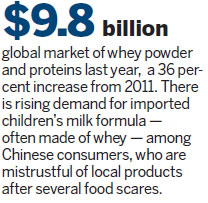Dairy companies seek new 'whey' into Chinese market
The powerful Dutch dairy industry is scrambling to cash in on exploding demand for whey, a cheese byproduct once used mainly in cattle feed that has now turned into a global nutritional hit.
Over the past decade whey powder, produced when milk separates into curd during the cheese-making process, has become a multi-billion-dollar industry.
Analysts say research shows that whey, once the ugly step-sister to its more widely-consumed sibling, cheese, is in fact one of the planet's best sources of natural protein.
From bodybuilding supplements to infant formula and fortified meals for the elderly, demand for whey has skyrocketed over the past five years.
Analysts predict that demand is likely to keep growing, driven by a taste for imported dairy products from Asia's growing middle class and the expanding ranks of elderly around the world.
Last year, whey powder and proteins represented a global market of $9.8 billion, up 36 percent from 2011, said Tage Affertsholt, dairy market specialist at the Danish-based 3A Business Consulting Group.
By 2017, the market will have expanded to $11.5 billion, Affertsholt predicted.
The demand for whey "just keeps growing, irrespective of the relative poor performance of the global economy," he told AFP.

"Some people used to say whey is a byproduct. Today cheese has become something of a byproduct."
"At one stage whey was worth pretty much nothing, only good to go into cattle feed," Rabobank senior dairy analyst Kevin Bellamy told AFP.
"Today, whey forms a major part of many dairy companies' profits."
Sights set on China
The world's top dairy exporter, New Zealand's Fonterra, is building a huge whey processing plant next to a cheese factory in the Netherlands' northern Friesland province.
Fonterra plans to export whey from the Netherlands to the massive Chinese market, said Jan Willem van der Windt, the company's European financial director.
"Whey is not available (in China) because there's no cheese production. We need to source this in Europe, where the cheese market is," he said.
The Dutch dairy industry, which produces popular cheeses like Gouda, is well-positioned to tap into rising demand for imported children's milk formula among Chinese consumers, who are mistrustful of local products after several food scares.
"The demand for dairy products has shot up, particularly in developing countries like in Asia and in China," said dairy analyst Affertsholt.
"You have a growing middle class, disenchanted with the quality of local products, who look toward countries like the Netherlands to fill the demand, especially when it comes to products like infant formula," he said.
The popularity of whey has been further boosted by a global health trend toward fortified foods and drinks, which has seen companies like Coca-Cola and others bring out whey-based drinks or snack bars.
A 'hot product'
The Dutch dairy industry, renowned for its top-quality cheese, is fighting for its stake in the rapidly expanding market.
The Netherlands is already one of Europe's top producers of demineralized whey powder - a key ingredient of baby formula - and Dutch companies are investing heavily in the research and development of whey-based products.
"All the major dairy companies in the world are squaring up for control of the liquid whey industry," added Affertsholt.
One of the world's largest dairy cooperatives, FrieslandCampina, now produces over 350,000 metric tons of whey dry matter a year.
"Whey is a hot product that resonates with the consumer," Fraser Tooley, FrieslandCampina's business developer, told AFP.
FrieslandCampina has improved its technology, processing capacity and quality systems at its plants, including whey production.
Last year, it opened an innovation center at Wageningen University in the central Netherlands, staffed by around 320 researchers, many focused on whey.
Tooley said the center is developing a range of new whey-enhanced products - including high-protein products for the elderly - but declined to go into more detail.
(China Daily 10/20/2014 page1)


















